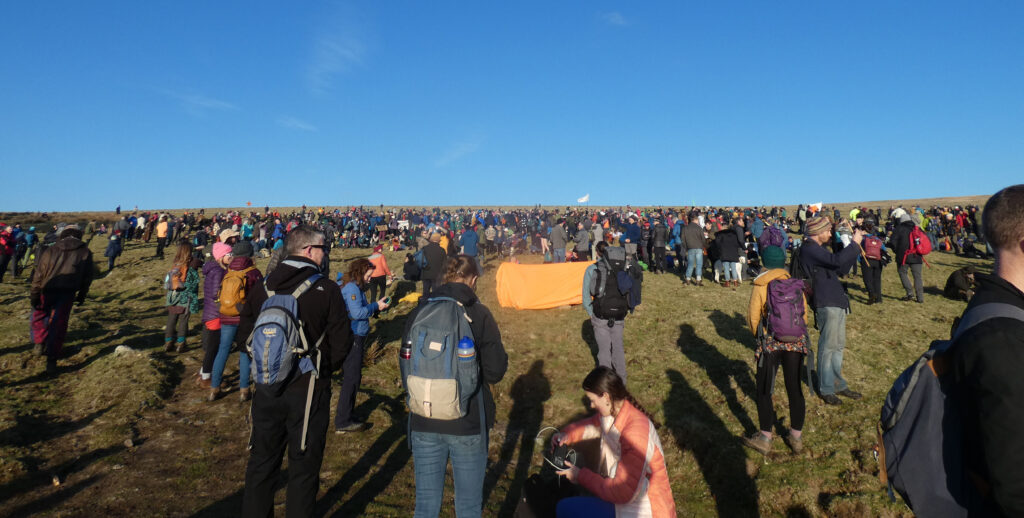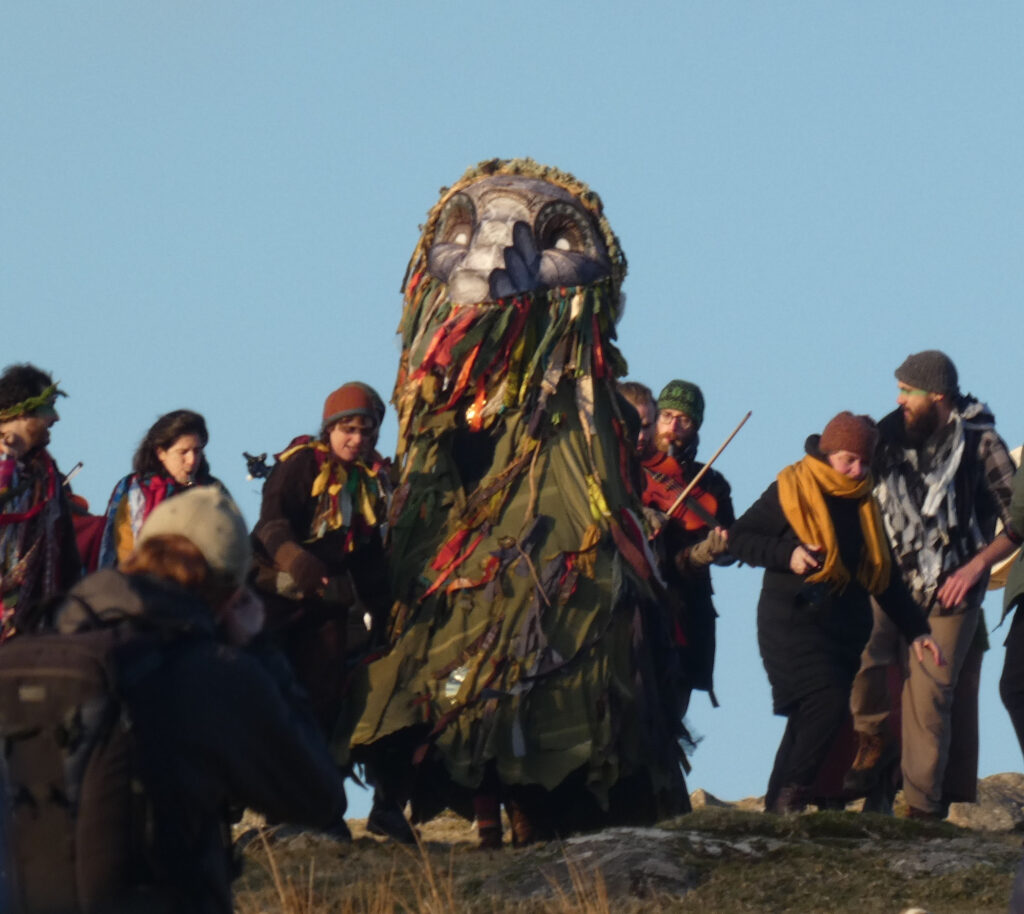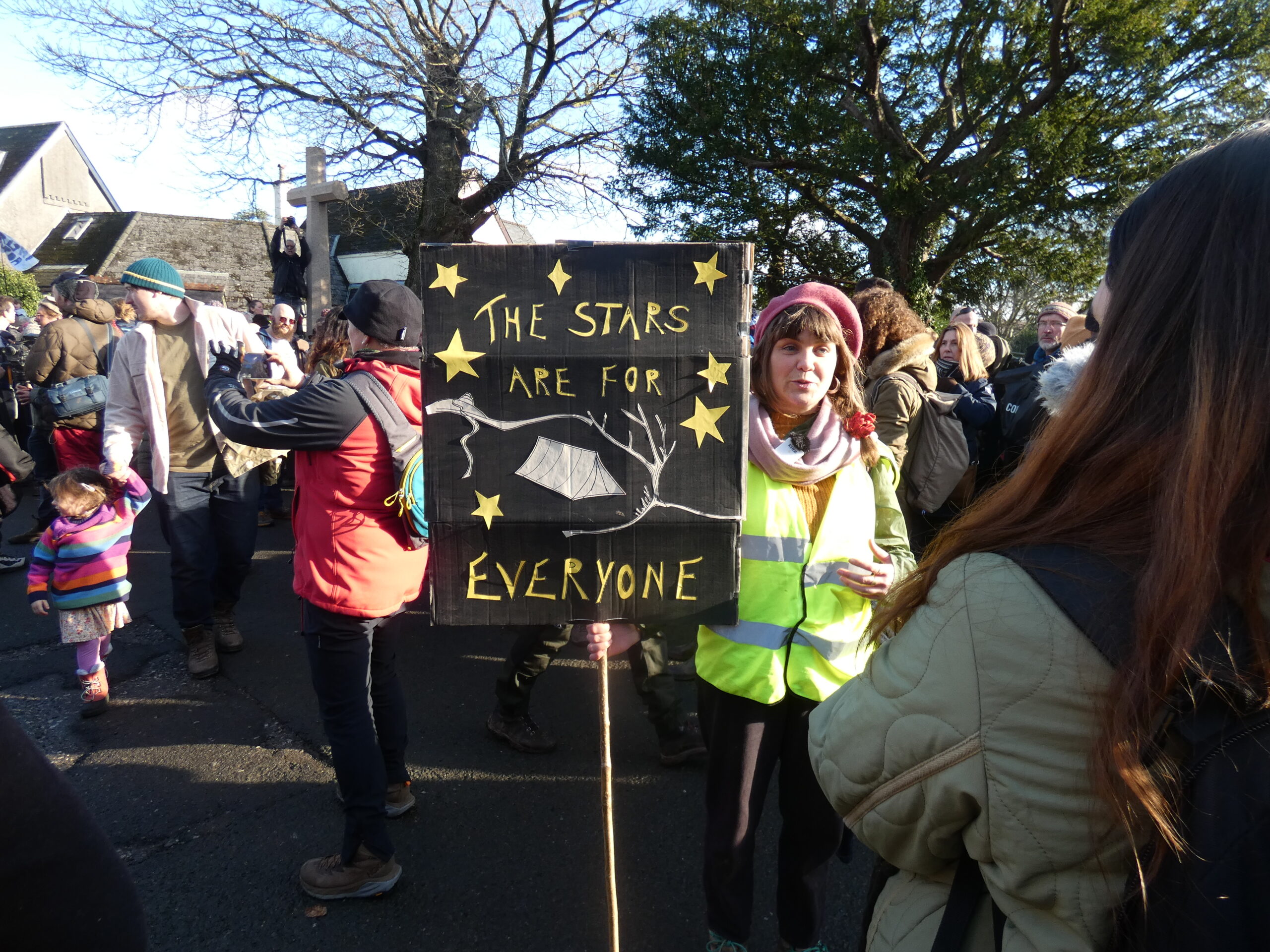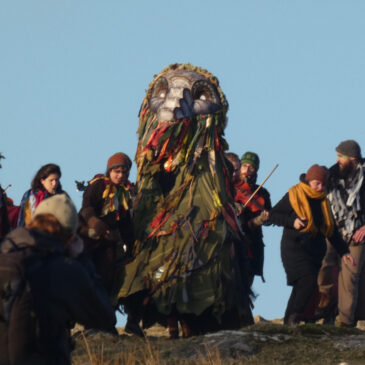By Jessica Broom
The Darwall case and the Campaign to ‘bring back’ Wild Camping
On Saturday 21st January 2023, over 3,000 people took part in a peaceful demonstration to protest against the outcome of a court case brought against Dartmoor National Park Authority by landowner Alexander Darwall, that would remove the right to wild camp on the moor. The protest was organised by Right to Roam and the Defend Wild Camping Action Group was set up in the days running up to that protest.

People from all walks of life, from young families to seasoned ramblers, from locals to those travelling hundreds of miles, gathered in the small village of Cornwood. They walked in solidarity two miles up onto Stall Moor, which forms part of the Darwalls’ estate, to bring awareness to land access rights and to raise ‘Old Crockern’, the guardian spirit of Dartmoor. Most participants started from and finished in Ivybridge which was an over 10 miles walk there and back.

Overview of the Darwall case
Alexander Darwall, a millionaire hedge fund manager, owns the 4,000-acre Blachford estate on southern Dartmoor (as well as a 16,000-acre estate in Scotland, where he has also brought in restrictions). Since buying this land 12 years ago he has limited public access by blocking off the car park (the New Waste car park was closed in 2014). Locals at the time launched a petition to appeal the closure of the car park, which has made it difficult to access the moor, with no success. Darwall offers pheasant shoots and deerstalking on the land and local residents have raised concerns about the ecological impact of these activities.
Dartmoor is the only National Park in England where wild camping is permitted without landowner consent (in the UK this is now only a protected right in Scotland). This recreational activity was seen as a right, upheld through the Dartmoor National Park Authority’s byelaws, and comes with conditions: that people taking part in wild or ‘backpack’ camping, spend just one or two nights under canvas, carry everything they need in a backpack and leave no trace. The Darwalls brought a case against the National Park, arguing that the right to wild camp on the moors on the moors, which has existed since 1985, never actually existed.
The group The Stars Are For Everyone, backed by the Right to Roam campaign and the Campaign for National Parks, organised protests, beginning with a gathering and walk out onto the moor at Princetown, Dartmoor, on 11th December. The following day there was another demonstration outside the Royal Courts of Justice in London, where the case was being heard.

Darwall’s lawyers argued that camping was not ‘recreation’ based on the definition of the term drawn up almost half a century ago, but that the law allowed for activities such as walking and picnicking, as well as the shooting of animals, and they won.
Following the ruling, the demonstration on Stall Moor on 21st January attracted a huge number of people who were outraged at the decision to limit access, as well as the wider issue of the pervasive power of a wealthy elite and land ownership in the UK. The demonstration drew the attention of the national media and was cited as the largest protest of its kind in a generation. The site was reportedly left spotless, as honours the main principles of true wild camping, to ‘leave no trace’.
People have been taking action to share their support in different ways, by attending demonstrations, writing to their local Members of Parliament and signing a petition for the government to extend the Right to Roam, which has garnered over 35,000 signatures to date.
The issue of ‘Fly Camping’ as opposed to ‘Wild Camping’
Darwall cited concern over littering and pollution on his estate as one of the reasons for limiting access. Fly camping and responsible wild or ‘backpack camping’ are two entirely different things which have been widely misconstrued in the media.
There have been growing issues with damage caused by fly campers on the moor, in particular over the Pandemic period, which drew a lot of attention. The abuse of the land in some areas resulted in ‘closure’ of sites such as Bellever in 2020 to allow important regeneration of the area. There are wider issues, however, not just with fly camping but with litter left by some day-trippers which, in beauty spots such Spitchwick, seemingly become worse every year. There is, indeed, a real problem with a lack of education and resources to tackle the issue. This is something that the wild camping community are very much aware of, many of whom cite returning from the moor bringing back more than they took after picking up litter on their way home.
Sites such as Bellever are the easier-to-access areas that are not far from the road, unlike Darwell’s area of the moor, which is accessible only to the fit and able. This ruling will do little to tackle the problems of littering and abuse of nature. In fact, it will serve to hinder the appreciation and education needed to embed the next generation with respect for the natural environment.
An interim agreement?
There have always been areas of the park that have been off-limits and that do not sit within the specified allowed area as set out on the wild camping map on Dartmoor National Park website.
The National Park has looked to reduce the permissive wild camping area previously as part of a review of the byelaws in November 2022 – launching a consultation which provoked a strong response from the public and interest groups. Any revision of the byelaws regarding camping was put on hold however, until the outcome of the legal challenge from the Darwells.
Following the court ruling and subsequent public outcry, Dartmoor National Park acted swiftly to negotiate a permissive access arrangement with the landowners. People will be allowed to camp in a smaller area of the park in exchange for a yet-to-be-decided fee paid from public funds. The Park Authority will be reaching out to organisations such as DEFRA and charities in order to find this extra money. The agreement could be withdrawn by landowners at any time and more than 123,500 acres are now off-limits to wild campers, a situation that is not acceptable to supporters of the campaign.
Working towards a more inclusive future
On 14th April Dartmoor National Park Authority voted unanimously to appeal the High Court ruling as there are grounds to do so and leave to appeal the judgement has been granted by the Court of Appeal.
The Dartmoor case has re-ignited the debate over land access and given momentum to the Right to Roam campaign which highlights the limitations citizens have in accessing and benefitting from our countryside – the majority of the population can now access only 8% of our country.
It is not just about securing freedoms within this one National Park but for these freedoms to be extended to our other National Parks. The campaign has drawn support from high profile writers, campaigners and celebrities such as George Monbiot, Ben Fogel and Robert Macfarlane. Many are speaking out about the positive societal impacts of extending the Right to Roam, such as for mental health and wellbeing as well as the educational benefits for our young people.
Support the Offical Fundraiser!
The shadow environment minister Alex Sobel has stated that Labour would extend the Right to Roam should they come into power, and that our National Parks should be open and accessible to all.
A fundraiser has been set up by the Dartmoor Preservation Association to assist the Dartmoor National Park Authority in raising £200,000 required to cover the legal costs of the appeal. Individuals have made great efforts to support the campaign but the fundraising and the wider campaign now needs to be escalated to continue raising awareness and help reach the challenging target. By May 2023 £50,000 has already been raised, click on the image below to find the fundraising page.

